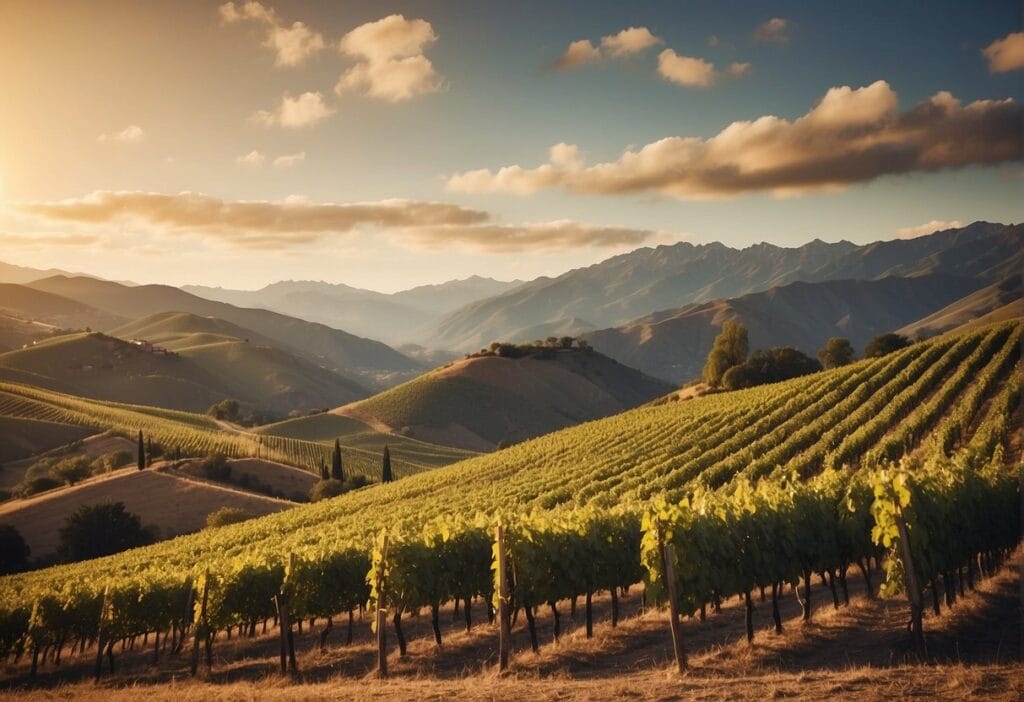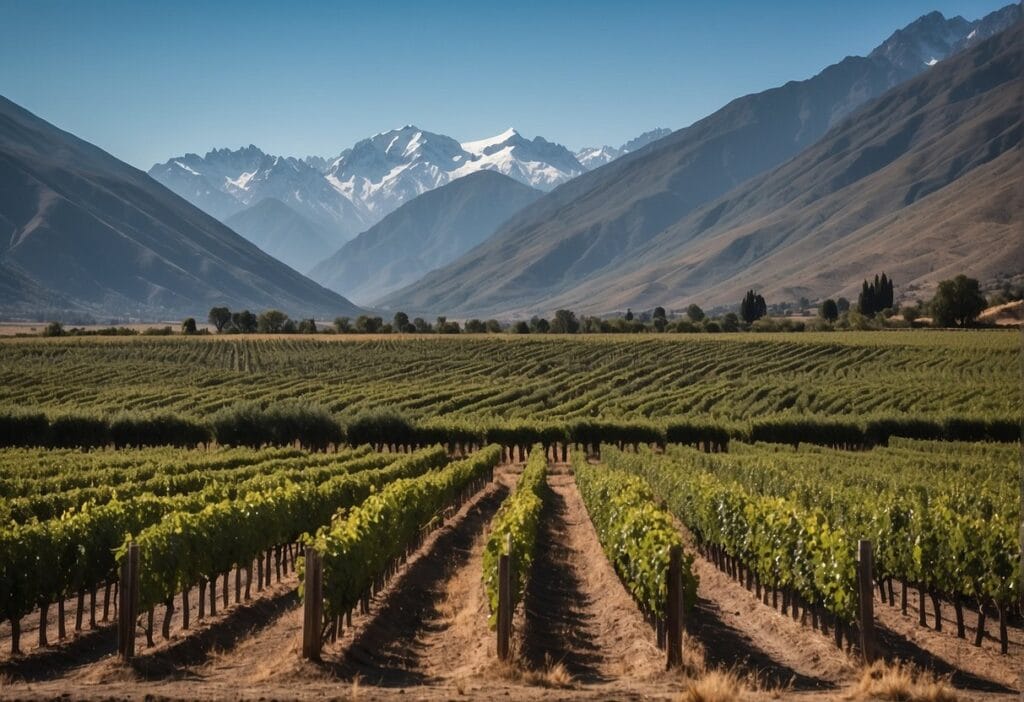Nestled in the sun-soaked valleys of northern Chile, the Elqui wine region is a remarkable area that combines unique geographical features with an innovating spirit in viticulture.
Cradled by the grandeur of the Andes and brushed by the cool breezes of the Pacific Ocean, this region produces wines with character that reflects its terroir. It is distinguished by its high-altitude vineyards and the prominent cultivation of grapes that thrive under the intense sunlight and clear skies, such as the Syrah and Carmenere varieties.

The importance of the Elqui Valley extends beyond wine production, as it is also renowned for being a prime location for the distillation of pisco, Chile’s national spirit. This spirit of innovation and quality is echoed in the cultural and economic spheres of the region, where agriculture works hand in hand with tourism.
Each year, numerous visitors are drawn to the valley to enjoy its rich culinary traditions, outdoor recreational activities, and the dark, star-filled skies that make it a haven for astronomers and romantics alike.
Key Takeaways
- The Elqui wine region is valued for its distinctive terroir and high-altitude vineyards.
- It plays a crucial role in both wine and pisco production, showcasing Chile’s diverse agricultural offerings.
- The blend of viticulture with tourism contributes significantly to the valley’s cultural and economic vibrancy.
Overview of the Elqui Wine Region
Nestled in the heart of northern Chile, the Elqui Valley is not only recognized for its premium wines but also for its unique desert landscapes and rich cultural heritage influenced by indigenous peoples and literary icons.
Location and Geography
The Elqui Valley is within the Coquimbo Region, situated at the southern tip of the Atacama Desert where the arid land meets the slopes of the Andes Mountains. This valley extends to the eastern reaches of La Serena, a coastal city bathed by the Pacific Ocean. The variegated terrain is a product of the valley’s proximity to these contrasting geographic features.
Climate and Environment
You’ll find a desert-like climate here, characterized by minimal rain, an abundance of sunshine, and clear skies that favor viticulture. The high exposure to the sun allows for the grapes to mature with high sugar content, ideal for winemaking. This climate also brings cool winds down from the Andes, a tempering force against the intense daytime heat.
Historical Background
The Elqui Valley is steeped in a historical tapestry woven by the Diaguitas, Quechua, and Mapuche peoples, which is evident in the local iconography and traditions. It is also the birthplace of the poet Gabriela Mistral, a Nobel laureate whose influence remains a point of pride for the region. This cultural richness infuses the winemaking practices with a sense of place and tradition.
Viticulture in Elqui
Nestled in northern Chile, Elqui Valley stands out for its dynamic approach to viticulture. Here, innovative irrigation practices meet diverse soil types, while the impact of high altitude offers a unique setting for various grape varieties. This region has carved out a distinctive niche in both pisco brandy and high-quality wine production.
Grape Varieties
In Elqui Valley, you’ll find an assortment of grape varieties suitable for both wine and pisco production. Notably, Syrah and Carmenere thrive here, catering to robust red wine blends. Meanwhile, Sauvignon Blanc, Chardonnay, and Pedro Ximenez represent the white varietals of choice, with each contributing to the region’s reputation for aromatic and flavorful wines. Quality-driven winemakers utilize these grapes to craft both distinguished varietals and complex blends.
Winemaking Practices
Winemaking in Elqui harnesses traditional practices alongside modern technology. With a commitment to quality, vineyards carefully time the harvest to ensure optimal ripeness and flavor concentration in the grapes. Pioneers in the wine-producing region meticulously manage oak aging of wines like Syrah and Pinot Noir to enhance their profile, while preserving the fresh character of white wines through temperature-controlled fermentation.
Irrigation and Soil Types
Vineyard irrigation is key in this arid climate. Water from the Elqui River supplements the rocky terrain and steep valleys, crucial for the vines. Soil types vary, with clay, silt, chalk soil, and rocky areas providing a mineral-rich terroir that influences the depth and character of the wine. Grape growers maximize the potential of their fruits by matching varietals with the most conducive soils.
Influence of Altitude
Elqui Valley’s vineyards benefit from the dramatic elevation, reaching up to 2,000 meters above sea level. The variation in altitude not only offers relief from equatorial heat but also contributes to wide diurnal temperature fluctuations. This is where your Malbec or Carménère will acquire their concentration and complexity, while white varietals maintain their characteristic bright acidity and aromatic intensity.
Wine and Pisco Production

Elqui Valley’s contribution to viticulture and distillation is significant with its distinctive Elqui wines and pisco, a traditional brandy of the area. Be ready to discover the unique wine styles and learn about the meticulous process of pisco distillation.
Elqui Valley Wines
The Elqui Valley wine region blends innovation and tradition to create wines with bright and aromatic features. Esteemed for their intensity, white wines like Sauvignon Blanc and Chardonnay originate from this region, alongside bold reds such as Carmenere and Syrah. Wineries like Falernia and Cavas del Valle take full advantage of the valley’s unique terroir characterized by sunny days and cool nights.
Pisco Distillation
In Elqui Valley, pisco is more than just a beverage; it’s a cultural emblem. Pisco distillation is a careful craft, resulting in the famed Pisco Elqui. The process creates a variety of pisco styles including those perfect for a refreshing pisco sour. The ABA Pisco Distillery stands out as a key player in maintaining the high standards of Chilean pisco production.
Prominent Wineries and Distilleries
Your exploration of Elqui Valley’s beverages wouldn’t be complete without visiting its renowned sites. Falernia and Cavas del Valle are wineries that showcase the region’s wine-making excellence. On the other hand, ABA Pisco Distillery represents the pinnacle of pisco production, offering tours to spirit enthusiasts.
If you’re looking for a break from wine and pisco, the Guayacan Brewery provides a unique local beer experience within the valley, carrying on the tradition of finely crafted beverages.
Cultural and Economic Impact

Elqui Valley’s wine region has blossomed into a cultural and economic powerhouse, directly contributing to the local and national economy through tourism, sustainable practices, and international wine trade which proudly places Chile on the global map.
Tourism and Gastronomy
When you visit the Elqui Valley, you’re treated to an extraordinary blend of astro-tourism and culinary delights. The Mamalluca Observatory couples stargazing with local wine sampling, drawing visitors worldwide. In towns like Vicuña, you can indulge in local cuisine paired beautifully with a glass of the region’s signature Pisco Sour. La Serena, a stone’s throw away, offers coastal flavors that perfectly complement the valley’s wines.
Sustainability and Community
The viticulture in Elqui Valley revolves around sustainability. With limited rainfall, grape growers have become adept at utilizing water resources efficiently. You’ll see a strong community ethos here, with practices geared toward preserving the natural beauty and purity of the region. This dedication contributes to maintaining the denomination of origin status, signifying Elqui Valley as a unique appellation for winemaking.
International Relations and Trade
Elqui Valley is a partner in progress with its South American neighbors, leveraging relations with Argentina and Peru within the wine industry. The Central Valley and Coquimbo Region are pivotal in this regard, facilitating trade and sharing best practices. The wines of Elqui, including Syrah and Sauvignon Blanc, have gained international recognition, bolstering Chile’s reputation in the global wine market and promoting cultural exchange beyond its borders.
Recreation and Activities

Elqui Valley is a tapestry of activities set against a backdrop of stunning landscapes. From stargazing under pristine skies to exploring rich local traditions, there’s a unique blend of recreation waiting for you.
Astronomical Tourism
The Elqui Valley is renowned for its crystal-clear skies and minimal rainfall, making it an ideal destination for astronomical observatories. You can visit world-class facilities, like the Cerro Mamalluca Observatory, to marvel at the stars through high-powered telescopes. The experience connects you with the cosmos, offering a rare opportunity to observe celestial phenomena.
Adventure and Relaxation
Immerse yourself in the diverse valleys and rolling hills of Elqui on horseback or by taking a guided horseback riding tour. For a more serene experience, find tranquility with meditation retreats set amidst the valley’s serene landscape. Adventure lovers can weave through the hills, valleys, and vineyards, where the climate and terrain are perfect for outdoor escapades.
Local Festivities and Traditions
Elqui Valley’s culture is vibrant and deeply rooted in the arts, celebrated through the legacy of poet Gabriela Mistral and the indigenous Quechua language. Participate in local festivals where music, dance, and traditional foods create a welcoming atmosphere that reflects the valley’s heritage. These celebrations are a colorful way to immerse yourself and connect with the community.
Frequently Asked Questions

In this section, you’ll find answers to common queries about the Elqui Valley’s winemaking scene, the climate, its location, and ways to enhance your visit.
What are some interesting facts about the Elqui wine region?
Elqui Valley is celebrated for its high-quality wines and is notably the northernmost wine region in Chile. Its unique location on the edge of the Atacama Desert contributes to its distinct terroir and exceptional conditions for producing Syrah and Carmenere grapes.
Can you describe the climate of the Elqui Valley and how it affects viticulture?
The climate in the Elqui Valley is a dry, desert-like climate with a significant amount of sunshine. This intense sunlight and the cool nights create an excellent environment for grapes to develop full flavors while retaining their acidity, which is key for producing quality wine.
Where exactly is the Elqui Valley situated within Chile?
The Elqui Valley lies about 400 kilometers north of Santiago, on the southern edge of the Atacama Desert. Its precise latitude near 29°S adds to its allure as Chile’s most northern wine-growing region.
What types of accommodations are available in the Elqui Valley for tourists?
You’ll find a range of accommodations in the Elqui Valley, from cozy bed and breakfasts to boutique hotels. Many offer stunning views of the vineyards and are focused on providing an immersive wine country experience.
Are there any observatories open to the public in the Elqui Valley, given its clear skies?
Yes, Elqui Valley’s exceptionally clear skies make it a prime location for astronomical observations. You can visit public observatories like the Cerro Mamalluca Observatory to gaze at the stars and learn more about the cosmos.
What are the must-visit wineries or vineyards in the Elqui Valley for the ultimate wine tour?
When in the Elqui Valley, don’t miss out on the renowned Viña Falernia and Cavas del Valle. These vineyards offer guided tours and tastings where you can savor the region’s flagship wines and learn about their winemaking processes.

